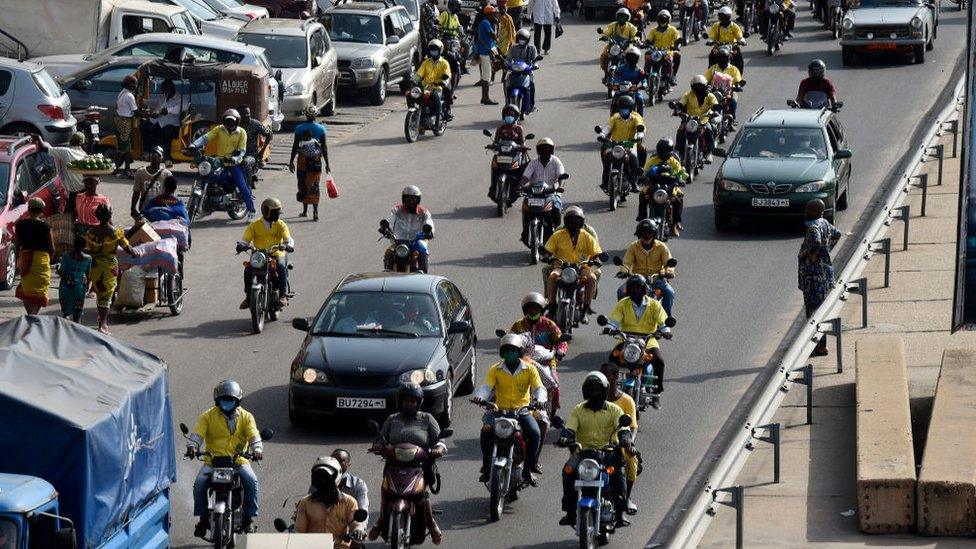Benin profile - Timeline (original) (raw)
 Image source, Getty Images
Image source, Getty Images
Image caption,
Motorbike taxis in Benin's port of Cotonou. The sector is a major employer and the motorbike taxi unions are influential political actors
A chronology of key events:
1946 - Dahomey becomes an overseas territory of France.
1958 - Dahomey becomes self-governing, within the French Community.
Independence
1960 - Dahomey gains independence and is admitted to the UN.
1960 - Elections won by the Parti Dahomeen de L'Unite. Party leader Hubert Maga becomes country's first president.
1963 - President Maga is deposed in a coup led by the army's Chief of Staff, Colonel Christophe Soglo.
Image source, Getty Images
Image caption,
Coup leader Colonel Christophe Soglo in 1963. He deposed another leader a few years later
1964 - Sourou-Migan Apithy is elected president.
1965 - General Soglo forces the president to step down and a provisional government is formed. In December he assumes power.
1967 - Major Maurice Kouandete leads a coup. Lt Col Alphonse Alley replaces Gen Soglo as head of state.
1968 - The military regime nominates Dr Emile-Derlin Zinsou as president.
1969 - Lt Col Kouandete deposes President Zinsou.
1970 - Presidential elections are held but abandoned. Power is ceded to a presidential council consisting of Ahomadegbe, Apithy and Maga, who received almost equal support in the abandoned poll. Maga is the first of the three to serve as president with a two-year term.
1972 - Ahomadegbe assumes the presidency from Maga for the next two-year term.
1972 - Socialist Major Mathieu Kerekou seizes power; the presidential council members are detained.
Dahomey becomes Benin
1975 - November - Dahomey is renamed the People's Republic of Benin.
1975 - The Marxist People's Revolutionary Party is made the country's sole political party.
1980 - Parliament unanimously elects sole contender Mr Kerekou as president.
1981 - Members of the former presidential council are released from house arrest.
1984 - Parliament increases the terms of the president and MPs ("people's commissioners") from three to five years. The number of commissioners is reduced from 336 to 196.
1988 - Two unsuccessful coup attempts.
1989 - Benin agrees to IMF and World Bank economic adjustment measures.
1989 - President Kerekou re-elected for a third term, drops Marxism as Benin's official ideology. Anti-government strikes and demonstrations take place.
Constitutional changes
1990 - Unrest continues. President Kerekou meets dissident leaders. Agreement on constitutional reform and multi-candidate presidential elections is reached.
1991 February - Legislative elections: No party secures an overall majority. The largest grouping is an alliance of pro-Soglo parties.
1991 March - President Kerekou is beaten by Nicephore Soglo in the first multi-candidate presidential elections. Kerekou is granted immunity from prosecution over actions taken since October 1972.
1995 - Legislative elections sees pro-Soglo liberal Renaissance Party form the new government.
1996 - Following accusations of irregularities in presidential elections, the constitutional court returns Mr Kerekou to office.
1999 - Legislative elections sees coalition government formed by 10 parties.
Kerekou re-elected
2001 March - Mr Kerekou re-elected president.
2002 December - First local elections since the end of the single-party regime more than 10 years earlier.
2003 March - Legislative elections: Parties supporting President Kerekou win 52 of the 83 elective seats.
2005 July - International Court of Justice awards most of the river islands along the disputed Benin-Niger border to Niger.
2006 March - Political newcomer Yayi Boni, running as an independent, wins the run-off vote in presidential elections. President Kerekou is barred from the poll under a constitutional age limit.
2006 April - World Bank and the African Development Bank approve debt relief for several countries including Benin
2007 April - President Yayi's coalition wins control of parliament in elections.
2008 April - Parties allied with President Yayi win a majority of local council seats nationwide, but the major cities in the south are all won by opposition parties.
Oil discovered
2009 February - Benin announces discovery of "significant quantities" of oil offshore near Seme, a town on the Nigeria-Benin border.
2011 March - President Yayi is re-elected. His main challenger, Adrien Houngbedji, alleges widespread fraud
2011 May - President Yayi's party and its allies regain control of parliament in elections.
2015 May - President Yayi's party loses parliamentary majority in elections.
Image source, Getty Images
Image caption,
President Patrice Talon
2016 March - Businessman Patrice Talon is elected president, defeating outgoing President Boni Yayi's candidate, Prime Minister Lionel Zinsou.
2017 April - Parliament narrowly rejects President Talon's proposal to to restrict his successors to a single six-year term, which he said would reduce "presidential complacency".
2019 April - Parliamentary elections marked by low turnout. The electoral commission, dominated by allies of President Talon, bans all opposition parties from standing. Several people are killed and scores injured in pre-poll violence in opposition strongholds in northern and eastern parts of the country.